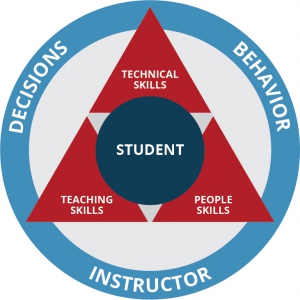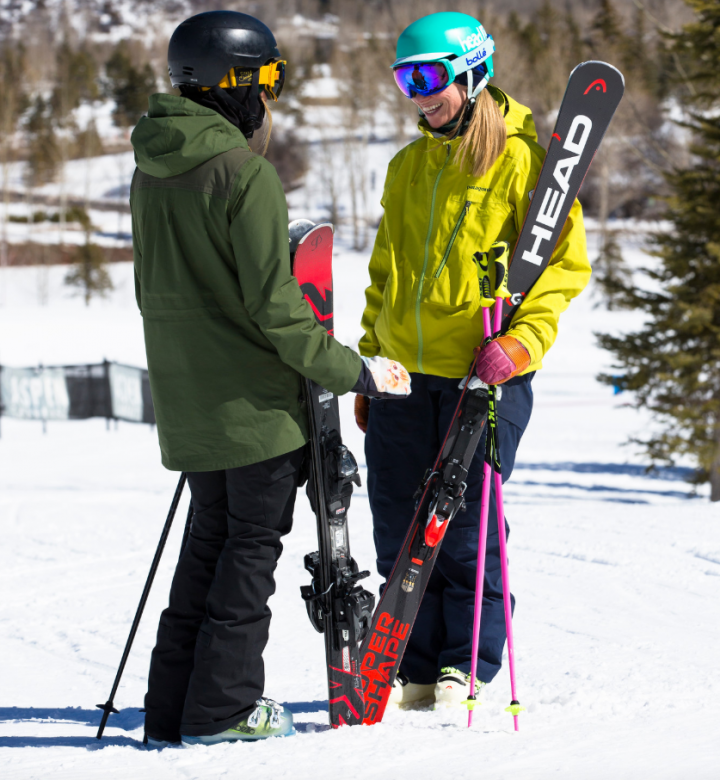PSIA-AASI’s Certification Standards help you learn how to apply the fundamentals of great skiing or snowboarding AND effective teaching so you can become a great instructor.
I want to learn about…
PSIA-AASI certifications represent a standard of consistent competency in three zones: beginner/novice, intermediate, and advanced/expert. Earning a PSIA-AASI certification validates your training from the world’s top snowsports education association and affirms you’re a professional in the snowsports industry.
You can pursue PSIA-AASI certifications for Level I, II, and III in five disciplines:
Adaptive
- Certification Standards: Adaptive Alpine 2014 (currently in transition to updated standards)
- Certification Standards: Adaptive Alpine 2023 (updated October 2023)
- Certification Standards: Adaptive Snowboard 2014 (currently in transition to updated standards)
- Certification Standards: Adaptive Snowboard 2023 (updated June 2023)
- Exam Supplement: Adaptive Alpine
- Exam Supplement: Adaptive Snowboard
Alpine
- Certification Standards: Alpine
Cross Country
- Certification Standards: Cross Country
Snowboard
- Certification Standards: Snowboard
Telemark
- Certification Standards: Telemark
PSIA-AASI specialist credentials are assessment-based certificate programs. Achieving the credential’s learning outcomes means you have met the assessment criteria. A Level I certification is a prerequisite for specialist standards.
Children’s Specialist
- Specialist Standards: Children's Specialist
Freestyle Specialist
- Specialist Standards: Freestyle
Performance Guides provide the details for successful and unsuccessful performance contributors, as they relate to the assessment criteria of the national standards.
- Performance Guide: People Skills
- Performance Guide: Teaching Skills
- Performance Guide: Alpine
- Performance Guide: Snowboard
- Performance Guide: Telemark
- Performance Guide: Cross Country
- Performance Guide: Children’s Specialist
- Performance Guide: Freestyle Specialist
- Performance Guide: Adaptive Alpine LI Bi and Mono Ski
- Performance Guide: Adaptive Alpine LI Cognitive and Visually Impaired
- Performance Guide: Adaptive Alpine LI Stand-Up Physical
Alpine
- Alpine: Level I
- Alpine: Level II Teaching
- Alpine: Level II Skiing
- Alpine: Level II Movement Analysis/Technical Understanding
- Alpine: Level III Teaching
- Alpine: Level III Skiing
- Alpine: Level III Movement Analysis/Technical Understanding
Children’s Specialist
Cross Country
- Cross Country: Level I
- Cross Country: Level II Teaching
- Cross Country: Level II Skiing
- Cross Country: Level II Movement Analysis/Technical Understanding
- Cross Country: Level III Teaching
- Cross Country: Level III Skiing
- Cross Country: Level III Movement Analysis/Technical Understanding
Snowboard
- Snowboard: Level I
- Snowboard: Level II Teaching
- Snowboard: Level II Riding
- Snowboard: Level II Movement Analysis/Technical Understanding
- Snowboard: Level III Teaching
- Snowboard: Level III Riding
- Snowboard: Level III Movement Analysis/Technical Understanding
Freestyle Specialist
- Freestyle Specialist 1 Teaching
- Freestyle Specialist 1 Technical
- Freestyle Specialist 2 Teaching
- Freestyle Specialist 2 Technical
- Freestyle Specialist 3 Teaching
- Freestyle Specialist 3 Technical
Telemark
- Telemark: Level I
- Telemark: Level II Teaching
- Telemark: Level II Skiing
- Telemark: Level II Movement Analysis/Technical Understanding
- Telemark: Level III Teaching
- Telemark: Level III Skiing
- Telemark: Level III Movement Analysis/Technical Understanding
Adaptive Alpine
- Adaptive Alpine: Level I Bi-Ski/Mono-Ski
- Adaptive Alpine: Level I Cognitive/Visual Impairment
- Adaptive Alpine: Level I Three-Track/Four-Track
- Adaptive Alpine: Level II Bi-Ski
- Adaptive Alpine: Level II Cognitive
- Adaptive Alpine: Level II Four-Track
- Adaptive Alpine: Level II Mono-Ski
- Adaptive Alpine: Level II Three-Track
- Adaptive Alpine: Level II Visual Impairment
- Adaptive Alpine: Level III Bi-Ski
- Adaptive Alpine: Level III Cognitive
- Adaptive Alpine: Level III Four-Track
- Adaptive Alpine: Level III Mono-Ski
- Adaptive Alpine: Level III Three-Track
- Adaptive Alpine: Level III Visual Impairment
PSIA-AASI is currently updating all certification standards to meet the changing needs of our snowsports education environment. The updated certification standards are built on the Learning Connection framework to give you the skill sets that make a great instructor – people skills, teaching skills, and technical skills. You can apply these skills to a variety of technical and tactical decisions based on your student’s ability, motivation, and more.
Read more about the Learning Connection in the Teaching Snowsports Manual or in this article, “Fundamentals Drive Consistency” from the Spring 2019 issue of 32 Degrees.

You’ll find similar and consistent language being used in all of PSIA-AASI Certification Standards, which use the Learning Outcome framework. This is important because the learning outcomes clearly explain what you’ll be able to do and show after you successfully complete your certification assessment!
- Learning Experiences: These are the training experiences – or tasks – you’ll do to achieve the learning outcomes. These are not requirements; they are suggested approaches to help you develop as a professional ski or snowboard educators.
- Assessment Activities: This term describes how your examiner will assess your knowledge and understanding in a given subject area.
- Assessment Criteria: This term explains and gives you a a clear description of levels of achievement — the standards outlined in the certification standards that detail learning outcomes and how you demonstrate you have met the learning outcomes. All examiners and divisions are using the exact same criteria.
- Assessment 6-point Scale: All assessment criteria that is described above will be measured by using this 6-point assessment scale…
-
- Essential elements are not observed or not present.
- Essential elements are beginning to appear.
- Essential elements appear, but not with consistency.
- Essential elements appear regularly at a satisfactory level.
- Essential elements appear frequently, above the required level.
- Essential elements appear continuously, at a superior level.
Please contact memberservices@psiaprodcms.azurewebsites.net if you have any questions. Best of luck to you on your education and certification journey!


